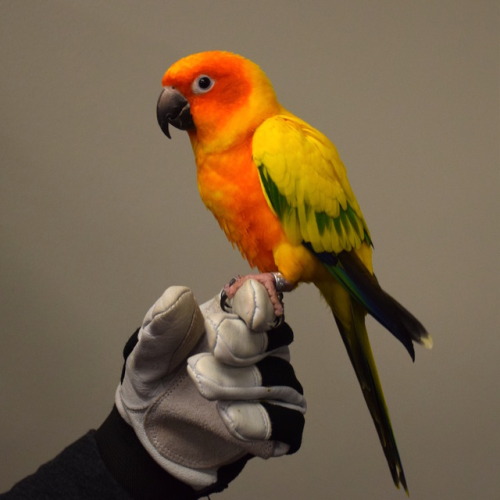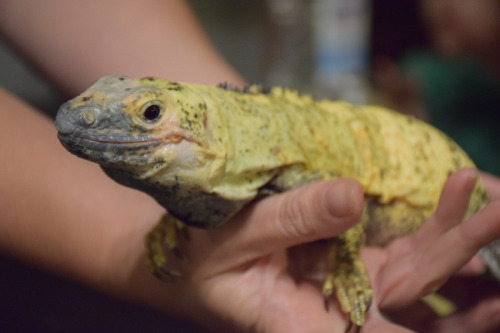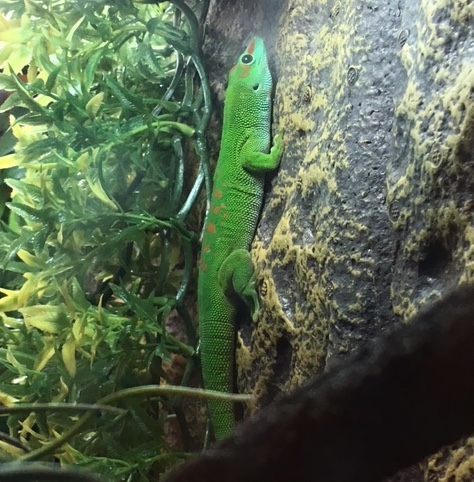by Leslie Wilson
Each year, animal care professionals from zoos, aquariums and yes, sometimes even museums, across the country celebrate National Zookeepers Week. What exactly is a “zookeeper?”
A zookeeper is a person who provides highly specialized care to animals. Did you know that Carnegie Museum of Natural History (CMNH) has a living collection that includes 15 animal ambassadors, representing 12 species from all over the world? At Carnegie Museum of Natural History, we have a team of five “animal husbandry specialists” that perform the day-to-day care for the collection. Zookeepers go by a range of titles at different organizations; here at CMNH, “animal husbandry specialist” is what fits our team best.
Animals need highly specialized care every day of the year. Even when the museum is closed. Even on holidays. Even during a pandemic. As animal husbandry specialists, we provide loving and high-quality care to the living collection every single day of the year. Daily feedings, habitat cleaning, behavioral observation, enrichment, training, and record keeping are all part of hard day’s work for an animal husbandry specialist. Animal husbandry specialists have deep rapport and strong, trusting relationships with the animals in our care. From any animal ambassador’s first day at CMNH to their last days on this earth, the animal husbandry staff support each unique ambassador through all stages of life, including the final step of saying good-bye, which to most, is the hardest part about working with animals. Being a “zookeeper” requires emotional fitness in addition to physical fitness; both are necessary for a happy, healthy “zookeeper.”
It’s not all poop-scooping, though! “Zookeepers” do SO MUCH MORE than “clean up” after animals. Another large area of focus for “zookeepers” is education. Every member of the CMNH animal husbandry team works directly with our audiences to share the rich natural history and unique personalities of our animal ambassadors. Creating empathy for the plight of wild animals in wild spaces, animal ambassadors are a powerful force in helping the museum achieve its mission of advocating for a sustainable future.
Animal Husbandry During a Global Pandemic
The last year presented unique challenges, including caring for the animals during CMNH’s Covid-related closures and adapting programs for social distancing and virtual environments once we re-opened. Team members found new ways to support each other and the animals through the disruption of our normal routines and designed creative new enrichment opportunities to make sure that every animal was (and is) healthy and happy. Meet the CMNH animal husbandry team below and learn how they’ve risen to the challenges of the last year!
Each team member was asked: “How did you improvise, adapt, persist: Keep on keepin’ on?”
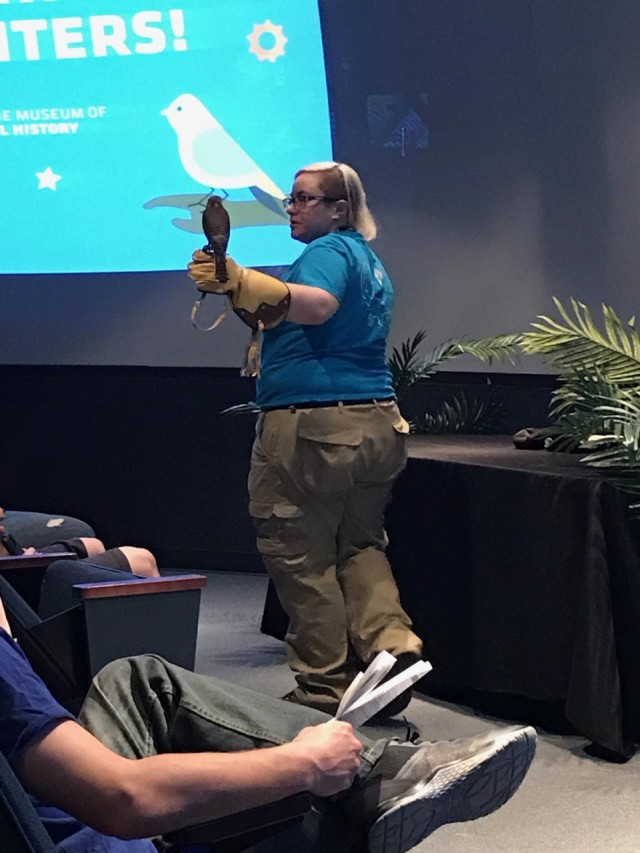
Meet Jo, the collection’s registrar! As the registrar, Jo is responsible for maintaining all records for the animals. Jo also is a frequent host of our weekly virtual Live Animal Encounters.
“The challenge for me was supporting the team, both human and animal, while being unable to be there in person. Transitioning animal programming to a virtual space was a unique challenge that afforded me the ability to still be present for our ambassador animals, support the humans on the husbandry team, and keep our audience engaged. I also found ways to guide my coworkers through animal husbandry challenges from home, connecting virtually to troubleshoot minor medical issues and enclosure overhauls.”
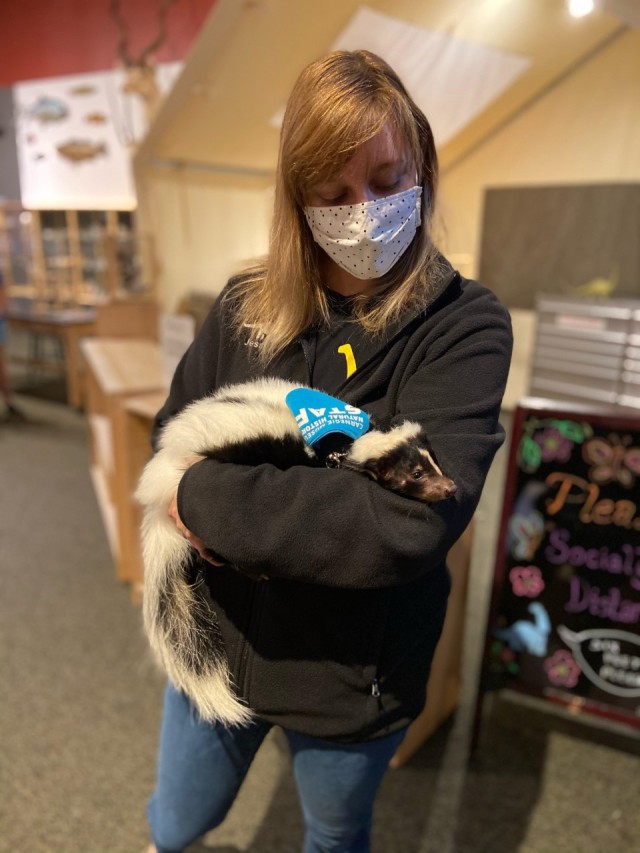
Meet Jess, the lead animal husbandry specialist! Jess is responsible for managing animal-related inventory, training husbandry staff and crafting animal enrichment for our sun conure, Mango. Jess often presents the animals from the museum during Wild Wednesdays: Virtual Live Animal Encounters.
“Being away from the animals and other staff members was a struggle, especially in the beginning of our closure. It was hard to go from seeing the animals and staff who cared for them every day to not being able to offer direct support or guidance. One way I wanted to help boost morale in the beginning was to create coloring sheets to cheer up our staff members who were missing the animals. I drew our animal ambassadors in funny scenarios including our coati cooking or painting like Bob Ross; our sun conure flying as an astronaut in space; our pied crow dressed up as his Game of Thrones namesake, Jon Snow. I feel that I’ve been given a great opportunity not only to learn more about animal education and how I can better myself in this field, but also to connect with the animal husbandry staff who are dedicated to providing our animal ambassadors with unique life experiences and exceptional care.”
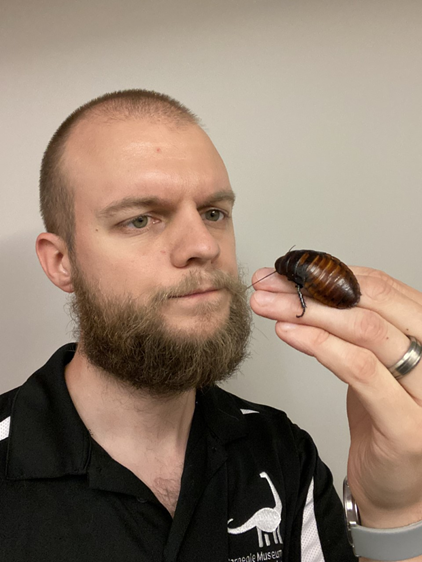
Meet Aaron, an animal husbandry specialist! Aaron plays a role in ambassador training, particularly with the birds in the collection. He also is great at building fun toys or furniture items for many of the animals, often from recycled materials, including expired fire hoses.
“I was fortunate to be one of the animal care team members to share in the daily care of our animal ambassadors during the museum closures. I relied a lot on the experience and skill of my human coworkers as I learned on-the-go. While the job was often difficult and dirty (at times literally poopy), I feel grateful that I had the opportunity to get to know my furry, scaly, and feathery coworkers more intimately. I still have a lot to learn about our animal ambassadors as we train and educate together. We’re constantly working to build trust and confidence in our relationships.”
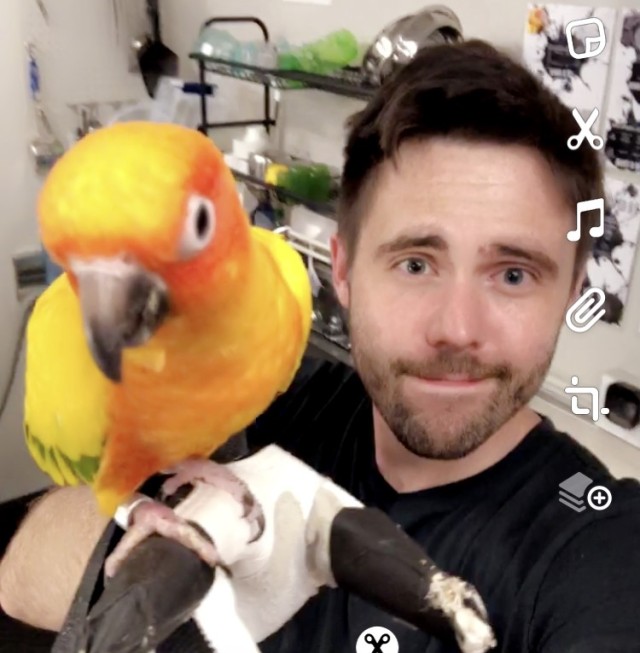
Meet John, an animal husbandry specialist! John serves as an animal husbandry specialist in addition to his role of managing CMNH’s outreach programming. Many of the outreach programs incorporate live animal ambassadors, so this is a perfect match!
“Before the pandemic, my primary relationship with our animals was through programming, and I did more teaching with our animals than I did animal care. Due to COVID, I started to focus more on animal husbandry. Learning to better care for the day-to-day needs of our Living Collection has 100% made me a better teacher. I have a stronger relationship with our birds, I understand the needs and mannerisms of our mammals better, and I’ve been able to answer questions about our reptiles that I just plain didn’t know the answers to before!”
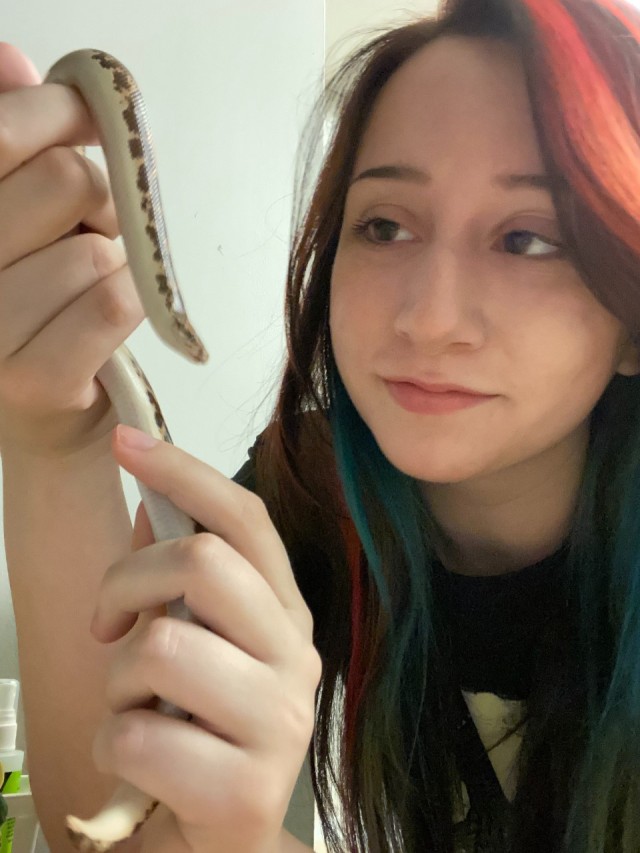
Meet Emma, an animal husbandry specialist! Emma is our newest animal husbandry specialist on our team. Emma works closely with Jon Snow, the African pied crow. Sometimes, it’s hard to tell the difference between their voices!
“The last year has been full of challenges when it comes to making sure that every animal here at the museum is getting the best possible care while also ensuring that we are following correct safety protocol. I owe a lot of my ability to adapt to the amazing connections that I and the other animal husbandry specialists have made with our education ambassadors. Something that sticks out to me specifically is the improvisation needed to ensure that the enrichment we provide every single day is just as impactful as the live programming that we were unable to do; every day proved to be a fun challenge when it came to creating a variety of new activities for the animals. Although it took some time to get into a new rhythm, I feel that our connections with our animal ambassadors are stronger than ever before.”
National Zookeepers Week
Zookeepers play an important role both in the specialized care of the collection and in educating our audiences about the plight of wild animals and wild spaces. This dedicated team of animal professionals seeks to generate empathy for all living things as part of the museum’s greater mission to find inspiration in our collections and advocate for a sustainable future. And that’s worth celebrating!
Thank you for celebrating National Zookeepers Week (July 18-24th) by reading this blog to learn more about “zookeepers” and the CMNH animal husbandry team. Other ways you can celebrate National Zookeeper’s Week include visiting your local zoo/aquarium/aviary/museum or sending a card to your local organization’s animal staff thanking them for their dedication to the animals in their care. If you know a “zookeeper” in your life, be sure to thank them for the important work they do!
“In the end, we will conserve only what we love;
we will love only what we understand;
and we will understand only what we are taught.”
-Baba Dioum
Related Content
Russian Tortoise Named Natasha (Video)
Carnegie Museum of Natural History Blog Citation Information
Blog author: Wilson, LesliePublication date: July 21, 2021
